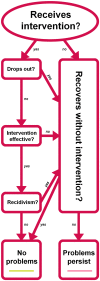Costs and longer-term savings of parenting programmes for the prevention of persistent conduct disorder: a modelling study
- PMID: 21999434
- PMCID: PMC3209459
- DOI: 10.1186/1471-2458-11-803
Costs and longer-term savings of parenting programmes for the prevention of persistent conduct disorder: a modelling study
Abstract
Background: Conduct disorders are the most common psychiatric disorders in children and may persist into adulthood in about 50% of cases. The costs to society are high and impact many public sector agencies. Parenting programmes have been shown to positively affect child behaviour, but little is known about their potential long-term cost-effectiveness. We therefore estimate the costs of and longer-term savings from evidence-based parenting programmes for the prevention of persistent conduct disorder.
Methods: A decision-analytic Markov model compares two scenarios: 1) a 5-year old with clinical conduct disorder receives an evidence-based parenting programme; 2) the same 5-year old does not receive the programme. Cost-savings analysis is performed by comparing the probability that conduct disorder persists over time in each scenario, adopting both a public sector and a societal perspective. If the intervention is successful in reducing persistent conduct disorder, cost savings may arise from reduced use of health services, education support, social care, voluntary agencies and from crimes averted.
Results: Results strongly suggest that parenting programmes reduce the chance that conduct disorder persists into adulthood and are cost-saving to the public sector within 5-8 years under base case conditions. Total savings to society over 25 years are estimated at £16,435 per family, which compares with an intervention cost in the range of £952-£2,078 (2008/09 prices).
Conclusions: Effective implementation of evidence-based parenting programmes is likely to yield cost savings to the public sector and society. More research is needed to address evidence gaps regarding the current level of provision, longer-term effectiveness and questions of implementation, engagement and equity.
Figures
References
-
- World Health Organization. International statistical classification of diseases and related health problems (ICD-10) Geneva: World Health Organization; 1992.
-
- Green H, McGinnity A, Meltzer H, Ford T, Goodman R. Mental health of children and young people in Great Britain 2004. Crown Copyright. Basingstoke, Hampshire: Palgrave Macmillan; 2005.
-
- Sainsbury Centre for Mental Health. The chance of a lifetime. Preventing early conduct problems and reducing crime. London: Sainsbury Centre for Mental Health; 2009.
-
- Richardson J, Joughin C. Parent Training Programmes for the Management of Young Children with Conduct Disorders: Findings from Research. London: Gaskell; 2002.
Publication types
MeSH terms
LinkOut - more resources
Full Text Sources
Medical



